Search results for :
Paid Maternity Leave Increasing, and More – New York News
Pack up the pool gear and beach towels: let’s explore some of the most interesting stories that have emerged from New York business schools this week.
Father’s Day Data: Columbia Business School Research Demonstrates Popularity of Paid Paternity Leave – Columbia Business Blog
How has the culture of paid maternity leave been changing recently? New research from the Columbia Business School explores the topic, which has increased for 12 percent of private-sector workers in the U.S. There is still no current federal law requiring the implementation of paid maternity leave, leaving the U.S. with the precarious title as the only “industrialized” country in the world without a federally-mandated law. Individual states, however, can implement the policy, which has been increasing since the early 2000s.
Earlier this year, New York became the fourth state in the U.S. to create policy regarding paid maternity leave, alongside New Jersey, Rhode Island, and California, which implemented the law back in 2004. According to the article, “California’s paid family leave produced a 46-percent increase in fathers taking time off to bond with newborn and newly-adopted children.”
CBS professor Ann Bartel writes, “This study should help inform the conversation around paid leave, because research shows it is fundamentally a family issue – appealing to both mothers and fathers. At its core, paid family leave is a ‘dad’ issue as much as it is a ‘mom’ issue. As Father’s Day approaches, our research demonstrates that fathers will greatly utilize paid family leave if it is offered, and their employers are supportive of them taking that important time away from the job.”
You can read more about “Paid Family Leave, Fathers’ Leave‐Taking, and Leave‐Sharing in Dual‐Earner Households,” which was published in the Journal of Policy Analysis and Management, here.
How Social Media’s Powerful ‘Silent Majority’ Moves Bitcoin Prices – Stevens Institute of Technology Blog
Stevens Institute of Technology School of Business professor Feng Mai recently led an investigation to understand how social media public sentiment can significantly manipulate the value of bitcoin.
Professor Mai’s research, which was published in the Journal of Management Information Systems, encompassed scholars from Ivey, Dickinson, and the University of Cincinnati, all of whom “collected and analyzed two years’ worth of forum posts on the world’s most popular public bitcoin forum, Bitcointalk.”
The team found that “periods of increasingly positive social media commentary do in fact influence the rising price of Bitcoin significantly.” Mai writes, “We wanted to know who is affecting the price: a vocal minority, who may be biased, or the quieter majority, who do not seem to have a reason to be untruthful, or both.”
According to the article, “the “silent majority” — infrequent Twitter and Bitcointalk users who took the time to comment on the cryptocurrency’s prospects — moved prices more, as much as ten times more, when they posted positive comments.”
Mai writes, “This was a big finding, and it does seem to prove that people are trusting the silent majority much more, perhaps because they do not seem to have an agenda.”
Check out the full Stevens’ article here.
Johnson Women MBAs Boast Record-Breaking Attendance at Forté Conference – Johnson School of Management Business Feed
As we recently highlighted, Cornell’s S.C. Johnson School of Management reported that 49 Cornell students attended this year’s FortéMBA Women’s Leadership Conference in Atlanta, Georgia—29 from the two-year MBA program, seven from the one-year program, and 13 from the Johnson Cornell Tech MBA program.
The Forté Conference brings “together admitted, enrolling, and current women MBAs from Forté sponsor business schools to explore career paths, meet recruiters and mentors, and hear from today’s most influential businesswomen.”
This year’s conference featured keynote speaker Joanna Lipman, veteran journalist, chief content officer of Gannet, editor-in-chief of USA Today, and author of That’s What She Said, who spoke on “gender bias in the workplace and provided tips for how women can leverage their value.”
In addition to a Power Pitch session and a number of workshopsand panels on “on communications strategies, interviewing, design thinking, sustainable and socially responsible careers, LinkedIn, and the future of feminism, among others,” the conference also included talks from Accenture North American CEO Julie Sweet and State Street EVP and Deputy Global Chief Investment Officer Lori Heinel.
Anne Latham, Two-Year MBA ’20, writes of her experience:
“The Forte Leadership Conference was an incredible few days. I walked away feeling fortunate to have met so many of my incredible female classmates! The Dialogue with Leadership session, moderated by Dean Erika James, featuring Lori Heinel and Julie Sweet, was a particular favorite of mine, due to their incredibly engaging and thought provoking remarks. I hope we all continue to live by Julie’s advice: ‘If your dreams don’t scare you, they’re not big enough!’”
You can read the full article from Cornell here.
Jeff Sessions Learns Lessons from Notre Dame, and More – Chicago News
Let’s explore some of the most interesting stories that have emerged from Chicago business schools this week.
Stop Flailing and Start Delivering – Kellogg Insights
Of the “five common issues that impede career progress” Northwestern Kellogg clinical professor of innovation and entrepreneurship Carter Cast writes about in his new book, The Right (and Wrong) Stuff: How Brilliant Careers Are Made—and Unmade, the one issue that people most frequently self-identify is struggling to keep up.
Cast writes, “Careers can derail when people don’t deliver on promises. This can be a real problem because fellow workers start to distance themselves when they think you can’t be counted on.”
Cast offers five suggestions for how to “get organized and get ahead.”
1) Be Clear on What’s Expected of You
“Being clear with your boss on what success looks like is really important for setting expectations and ensuring you’re aligned. What are your goals and objectives for the year? What are the key initiatives that map to those objectives? What are the timelines for those initiatives, and what sort of resources will you need?”
2) Understand Your Organization’s Workflow Process
Cast says creative types tend to “overpromise and underdeliver” because “their eyes are typically bigger than their stomachs.” To these folks, Cast says, “Decide which tasks will really move the needle for your organization, and focus on those first. You can’t treat every message in your inbox equally.”
3) Be Intentional about Prioritizing Your Work
Cast suggests “breaking your day into segments and tackling challenging work during times when you are sharpest and most productive.” For instance, if your brain is most active between six and ten in the morning, for instance, that may not be the best time to respond to noncritical emails.”
YOU MAY ALSO LIKE: Kellogg Admissions Director Shares Insights on 2019 MBA Application
4) Learn How to Say “No”
Cast writes that people-pleasers “tend to take on more than they should—their default response is, “yes, why not?” But learning when to say “no,” and learning to do it tactfully, is critical for preserving valuable time and energy.”
5) Look for Opportunities to Delegate
Cast says, “We tend to think the best person to perform a given task is ourselves. In many cases, you have to learn to let go a bit. Things won’t go exactly the way you’d like, but you have to move forward and avoid needless distractions.”
You can check out the full article here.
Larry Gies Urges 2018 Graduates to “Find Your Way” – Gies School of Business Blog
Madison Industries founder, president, and CEO Larry Gies used his speech at Gies’ recent Convocation ceremony, which honored the “1,824 bachelor’s, master’s, and doctoral degree recipients,” as an opportunity to inspire graduates to spend time pinpointing their passion for what they do—or their “why.”
Gies, who donated $150 million to the University of Illinois last year, thus, changing the name of the business school in his honor, explains, “Knowing your why is critical. It is the ability to connect the dots between what you’re doing each and every day and a higher purpose. Our why is what drives us, inspires others around us, and allows us to persevere during those difficult moments. To put it simply, when you find your why, you love what you do.”
Gies adds, “I was forty-five before I found my why.”
Find out more about Gies’ speech here.
I’m a Biblical Scholar. It’s Clear That Jeff Sessions Needs a Bible Lesson – Mendoza Ideas & News
Notre Dame Mendoza business ethics professor and former Jesuit priest Joseph Holt contributed an op-ed to a recent issue of Fortune in which he took Attorney General Jeff Sessions to task for his “use of scripture to defend the Trump administration’s immigration policies.”
Professor Holt writes, “Sessions is pursuing justice understood as the strict and impartial application of the law. That shriveled understanding of justice is captured in the statement by Homeland Security Secretary Kirstjen Nielsen: ‘In the United States, if you break the law, you go to jail and you’re separated from your family.’
He adds, “From that viewpoint justice and mercy are opposed, because mercy could impede the administration of strict justice. But tzedek [the Hebrew word for “justice”] and its derivative tzedakah (which is a commandment to give as an act of social justice), mean justice and mercy working in unison.”
You can read the full article here.
Top MBA Employers: Building a Foundation with Chevron
Even with the preparation provided by an MBA, entering back into the business world after school can be daunting. California oil giant Chevron, one of the 20 largest companies in the world, offers a program that provides additional support and training for MBA grads to help them take their education to the next level. The oil company’s competitive business and commercial MBA program (BCMP) provides opportunities and resources for motivated grads aspiring to senior management positions. Chevron has made Glassdoor’s list of “Best Places to Work” eight times, and made Indeed’s list of Best Places to Work in 2017, likely due to the numerable opportunities for advancement and considerate treatment of employees.
According to Business Insider, “Chevron also has programs for new mothers and families, such as rooms where new mothers can nurse, a college-counseling program that guides employees and their families through the college application process, and a program that reimburses employees up to $5,000 for adoption-related expenses.”
Current MBA’s and recent grads interested in working at an oil will surely want to add Chevron to their list of potential employers.
The Chevron Business and Commercial MBA Program
During Chevron’s two-year business and commercial MBA program, students will have access to a variety of resources, including mentorship from senior members of the Chevron team. Program participants will do four six-month rotations involving projects in any of the following areas: strategy, planning and business analysis; supply chain/value chain optimization; business development; asset commercialization; decision analysis; hydrocarbon scheduling and logistics; hydrocarbon trading analytics; or marketing and sales.
Program recruits should have geographic flexibility, as the program can take them to California, Texas, Pennsylvania, Louisiana, Mississippi, Kazakhstan, Nigeria, or Singapore. Participants can look forward to regular performance feedback on each assignment. The BCMP allows MBA grads to accelerate their career trajectory, to achieve more senior positions more quickly.
You can take a look at Chevron’s full BCMP brochure here.
Getting A Foot In the Door: Summer Internship Program
If you’re interested in pursuing Chevron’s business and commercial MBA program, applying for the company’s summer internship is the way to go. In fact, Chevron considers the 10-12 week internship program to be an extended interview that provides an in-depth view of how potential long-term recruits operate in a project-oriented setting. MBA’s can apply after their first year of grad school.
Though a long-term Chevron job offers a multitude of possible locations, the internship will take place in either Houston, Texas, or San Ramon, California (home to the original company headquarter’s). To be eligible for the internship, grads should have a minimum of three years of work experience between their undergrad and grad educations. Chevron looks for adaptability, collaboration skills, analytical chops, and leadership qualities in its internship recruits.

Chevron MBA internships take place in several U.S. cities, including its Houston offices.
Look Out for These Boston Internships
If you’ve read MetroMBA’s look at how summer internships play a crucial role for MBA students, you’re probably already familiar with the many benefits of interning during your MBA career. Between forging professional connections, gaining hands-on experience, and top tier salaries, MBA students have lot to gain from seeking out these opportunities. Boston internships manage to stand out, in particular, because of a wealth of excellent business school options.
Of course, the internship model is a win-win for all participants: students get the opportunity for professional experience, and companies get to work alongside emerging talent in the business world. Companies across the U.S. actively search for and recruit this talent. The need and capacity for interns, however, can vary from organization to organization. As students begin their search for the perfect internship, and can be important to take note of what companies are the biggest internship employers in their area.
Boston Internships for MBAs
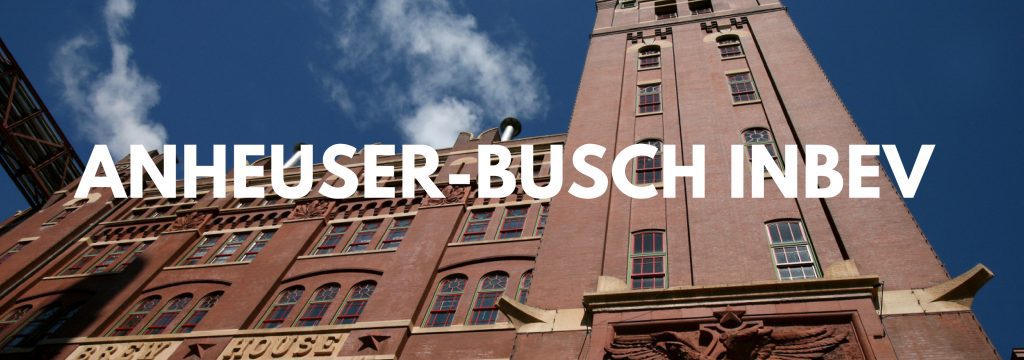
Anheuser-Busch InBev (AB InBev), created ten years ago through the merger of Anheuser-Busch and InBev, is one of top hirers for MBA students in the Boston region. A Belgian-Brazilian beverage and brewing company, AB InBev has offices throughout the world, currently employing around 183,000 people. Given the global nature of their product, the company sponsors MBA and internship opportunities with a focus on global business. Each summer, the company offers a 10-12 week summer internship at their New York office, which often results in getting hired into the company’s Global MBA program—a one year high potential leadership program that prepares participants for quick career growth.
Anheuser-Busch InBev was one of the top hirers for MBA internships at both the Harvard Business School and the Sloan School of Management at MIT, two of the most highly ranked business programs in the world. At MIT Sloan, AB InBev employed nine members of the Class of 2017 as summer interns.

Founded 173 years ago in London, Deloitte remains one of the world’s top professional services networks today, providing tax, consulting, enterprise risk and financial advisory services throughout the world. As of 2016, Deloitte was recognized as the 6th largest privately owned organization in the United States.
With roughly 263,900 employees worldwide, it’s probably no surprise that Deloitte offers plenty of Boston internships. Deloitte Consulting hired six MBA interns from MIT Sloan for the summer of 2017, and also made the lists of top employers for F.W. Olin, Harvard, and Suffolk University’s Sawyer Business School.
The vast number of student interns employed at Deloitte may be a reflection of their vast internship program, which include programs like the Deloitte Consulting Immersion Program, Deloitte Women’s Leadership Launch, and the Advanced Degree Veterans’ Forum.

At Boston University’s Questrom School of Business, 108 different companies hired 140 students for internships in 2018. CVS Health, also an employer for MBAs from Harvard Business School and Babson College’s F.W. Olin Graduate School of Business, hired five students from Questrom for summer internships, making it the number one employer for that school.
CVS Health Corporation, headquartered in Woonsocket, Rhode Island, has grown since 1964 into a top Fortune 500 company with more than 246,000 employees and $177 billion in annual revenue. In December 2017, the retail and health care company also made headlines when it acquired health insurance mega-company Aetna for $69 billion.
CVS Health offers a number of MBA internship programs for MBA students, depending on their interest within the field. Among them are the CVS Year-round internship, Spanish Immersion Summer Internship, and Specialty Clinical Innovation Internship. CVS also believes in students growing their careers with the organization, which likely means greater opportunity for an internship to turn into a long term career.
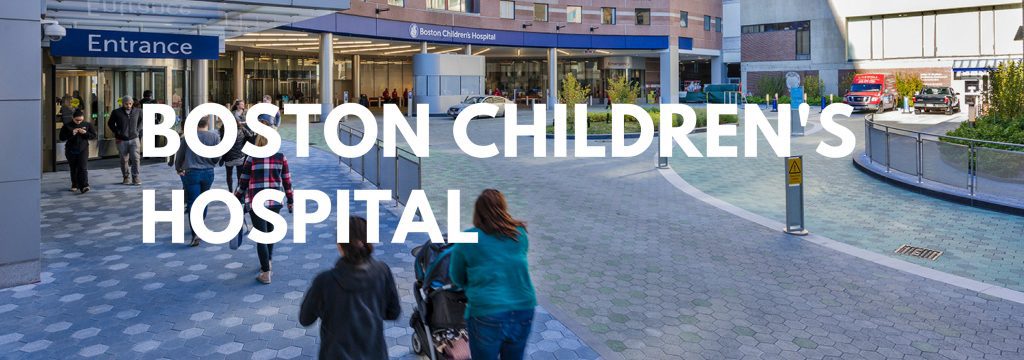
With the growing popularity of jobs within the healthcare administration field, it should come as no surprise that one of the top employers for MBA internships in Boston is the Boston Children’s Hospital. The hospital, founded in 1869, has been ranked by the U.S. News & World Report #1 in eight of ten clinical specialties. For 2018-19, it was named the country’s number one pediatric hospital.
The hospital is affiliated with Harvard Medical School, so it’s likely no surprise that they are a top employer of MBA students as well, learning about the other side of health care. They are also one of the top employers for MBA students at Northeastern’s D’Amore-McKim School of Business, which requires students to pursue a corporate residency for six months of its 24-month full-time MBA program.
Real Humans of the Drexel LeBow Class of 2019
Over 100 years since the founding of what would become the Drexel University Bennett S. LeBow College of Business, the business school, located in the heart of Philadelphia, has steadily transformed into one of the nation’s most dynamic landing spots for MBA candidates. Alongside the LeBow MBA, Masters and Executive programs, the school offers a highly—regarded part-time and Online MBA, both of which have been recognized among the best in the country by U.S. News & World Report and the Financial Times.
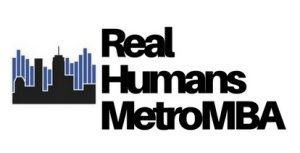
With so many acclaimed AACSB-accredited programs, its only natural that the LeBow College of Business would be cultivating an increasingly diverse MBA class. These students have an opportunity to study accounting, business analytics, supply chain management & logistics, economics, finance, general business and marketing, taught by over 100 full-time professors at the business school. Currently, around 3,800 students are enrolled in various graduate, undergraduate, and doctoral programs. An estimated 1,020 are enrolled in the graduate programs alone, making LeBow one of the largest private business schools in the country.
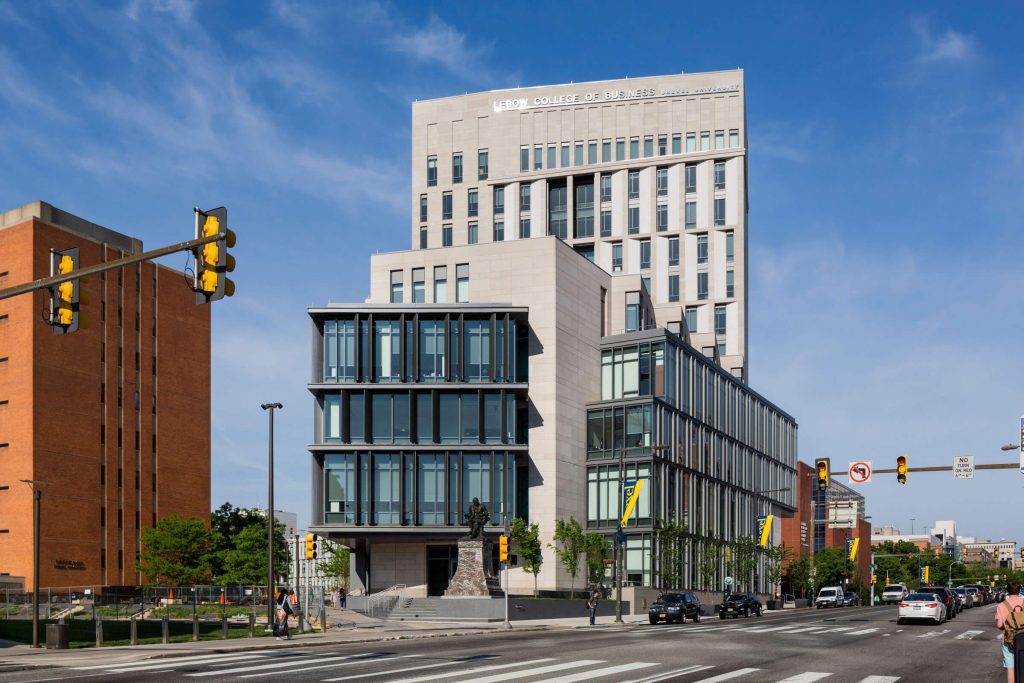
Outside Gerri C. LeBow Hall, the center of Drexel’s LeBow College of Business
Of the 3,800 aforementioned students at LeBow, approximately 450 come from 60 countries outside of the United States. The numbers, however, only tell a small story about the Drexel LeBow Class of 2019. To learn more about what it means to earn a graduate degree from LeBow, we interview five current students, who come from several corners of the world: from Asia, to Europe, to right here in Philly. Read on to see what’s in store for these students at LeBow and what life after an MBA and Masters may look like.
What are the Best MBA Programs by Specialty?
Each year, U.S. News and World Report looks at the top business schools around the country to decide which offer the best MBA programs. The goal is to help MBA candidates most effectively choose the best MBA degree to help them achieve their goals based on their interests and strengths. The problem is that there are hundreds of programs and it can be difficult to weed out all the noise to get to the information that you want most.
That’s why the U.S. News and World Report decided to break down all of their findings into a more easily consumable ranking. They outlined the top MBA programs by discipline to help you quickly and easily find the school you’re looking for. Each of the schools on the list was chosen based on alumni interviews, schools statistics, research data, and more.
We’ve broken down the results below along with crucial information about each school listed and where you can learn more information.
Facebook COO Sheryl Sandberg Arrives at MIT, and More – Boston News
What’s happening at the best Boston business schools this week?
Asia Is Ripe For Investments. Here’s How U.S. Companies Can Capitalize – D’Amore-McKim Blog
The Northeastern University D’Amore-McKim School of Business recently published an overview of the recent Emerging Markets’ Symposium, in which Ravi Ramamurti, University Distinguished Professor of international business and strategy brought together seven CEOs and corporate executives to unpack the discussion topic, “On the Rise of Asia: How Should U.S. Companies Respond.”
Jimmy Weng, DMSB’07, and Credit Suisse’s current head of offshore investment strategies, told the audience via conference call that he believed “Asia’s economy is entering a “supercycle” of market boom.”
Symposium organizer Ramamurti said, “China is leading the way to a new era in globalization. The headroom for growth in Asia is very significant.”
You can read more about the symposium here.
Sheryl Sandberg On Facebook’s Missteps and What Comes Next – MIT Sloan Newsroom
Facebook COO Sheryl Sandberg delivered MIT’s 2018 commencement address last week and used her speech as an opportunity to come clean and share the lessons learned from her company’s recent Cambridge Analytica data mining imbroglio.
She told the audience, “It’s painful when you miss something — when you make the mistake of believing so much in the good you are seeing that you don’t see the bad. It’s hard when you know that you let people down.”

Sandberg speaking at the 2018 MIT commencement / Photo via Dominick Reuter
“The larger challenge is one all of us here today must face. The role of technology in our lives is growing — and that means our relationship with technology is changing. We have to change, too. We have to recognize the full weight of our responsibilities.”
You can read more Sandberg’s commencement speech and check out footage of the event here.
A Big Problem with Big Problems – Questrom Blog
Boston University Questrom School of Business associate professors Stine Grodal and Siobhan O’Mahony recently published a new study that explores how “competing and misaligned goals—combined with a lack of oversight—can derail an ambitious vision.”
In their paper “How does a Grand Challenge Become Displaced? Explaining the Duality of Field Mobilization,” Grodal explains how common “interest misalignment” can be when it comes to tackling big problems.
“The academic community might agree to focus on a grand challenge, but [individual] professors are also interested in publishing in top journals and funding graduate students, which can create misalignment between a grand challenge and a community’s existing goals.”
It’s also much easier to “develop advances in existing areas” rather than explore uncharted terrain. “People graft on to the grand challenge but are rewarded by the status quo, and end up pursuing goals that are closer to their existing work.”
Oversight is key to keeping researchers on track. Grodal notes, “With little overarching supervision, it shouldn’t be a surprise that communities found plenty of reasons to support their own missions more robustly than the mission of the grand challenge.”
Read the complete article and study here.
The California MBA Program Guide
If you’re looking to earn a California MBA, where should you go to school? Should you choose a top MBA program in Los Angeles or San Francisco? Both cities offer beautiful weather, gorgeous beaches, and world-class business education, but is one location better than the other?
Los Angeles vs. San Francisco
To get started, it’s necessary to compare the cost of living in Los Angeles and San Francisco. According to Numbeo, the world’s largest database containing user contributed data about cities, San Francisco is far and away the more expensive place to live. You would need $7,748.24 in San Francisco, CA to afford the same lifestyle that you can have for $5,700 in Los Angeles. That’s just over $2,000 more per month needed to live in San Francisco, and here’s how that’s broken down.
- Consumer Prices:98 percent higher in San Francisco
- Rent Prices: 51 percent higher in San Francisco
- Restaurant Prices: 62 percent higher in San Francisco
- Groceries Cost: 8 percent higher in San Francisco
- Local Purchasing Power: 77 percent higher in San Francisco
Right off the bat, it’s obvious that the cost of rent (real estate) is what will eat up most of your paycheck in San Francisco, but is that offset by anything? Here are the other things to consider when choosing between San Francisco and Los Angeles.
- Industries
- Los Angeles is ranked top in the country for manufacturing with over 500,000 workers in the industry. Other top industries include banking and finance (more than 100 foreign and domestic banks), entertainment, and tourism.
- San Francisco, on the other hand, is known as Silicon Valley (with San Jose) for its technology companies and startups (Intel, Apple, Genentech, Google, Uber, and Twitter). It’s also a great city for finance, global business, medical science, biotechnology, tourism, and fashion apparel (home of the Levi Strauss & Co headquarters).
- Economic Development: According to the Center for Jobs, San Francisco far and away outperforms Los Angeles in terms of economic growth and development with the Bay Area growing year-over-year while LA has struggled with almost consistent decreases.

- Top Companies: California is home to 53 Fortune 500 companies, second only to NYC. And more of those companies are located in the Bay Area compared to Los Angeles. San Francisco is home to Apple (3), McKesson (5), Chevron (19), and Wells Fargo (25). While Los Angeles is home to Aecom (161), CBRE (214), and Reliance Steel & Aluminum Co (320).
Los Angeles vs San Francisco MBA Programs
The next step is to compare the top three MBA programs in each city. In particular, we wanted to take a look at the tuition rates (two years), GMAT averages, and post-graduation salaries at each program in each city to get a well-rounded picture.
There are a few things to note right away.
- San Francisco is home to more highly ranked MBA programs with two ranking in the top ten on every list. However, it’s important to note that both cities have programs that rank well and are considered top tier schools.
- The average tuition in each city is fairly even. However, the most expensive ($137,00) and the most affordable ($77,000) schools are located in San Francisco, whereas Los Angeles is more even regarding tuition across the board.
- You’ll need a better GMAT score to go to a school in San Francisco, and that GMAT score translates into a higher salary after graduation. San Francisco graduates earn about $11,000 more per year compared to their LA counterparts.
Here’s how it all breaks down per school.
Top 3 Los Angeles MBA Programs
Anderson School of Management – UCLA
The UCLA Anderson School of Management offers a full-time MBA, a part-time MBA, an Executive MBA, and a UCLA-NUS Global MBA (Asia Pacific) program. It’s considered one of the top business schools in the world, ranking 6th in the Economist, 15th in Forbes, 16th in the U.S. News & World Report, and 25th in Financial Times.
- Tuition Rates (two years): $117,176
- GMAT Averages: 719
- Post-Grad Salaries (Mean): $119,964
Marshall School of Business – USC
The Marshall School of Business at USC offers a full-time MBA program, a part-time MBA, an Executive MBA, and IBEAR (International Business Education and Research) MBA, and an Online MBA program. The school’s full-time MBA program is ranked: 20th in the U.S. News & World Report, 33rd in Forbes, 59th in Financial Times, and 65th in the Economist.
- Tuition Rates (two years): $116,361
- GMAT Averages: 703
- Post-Grad Salaries (Mean): $115,309
The Paul Merage School of Business – University of California, Irvine
The Paul Merage School of Business has both a full-time MBA program as well as a part-time fully-employed MBA program. In addition, the school offers an Executive MBA and a Health Care Executive MBA program. The business school is ranked highly across multiple rankings including 41st in Forbes, 42nd in the U.S. News & World Report, 56th in the Economist, 64th in Financial Times.
- Tuition Rates (two years): $87,661
- GMAT Averages: 652
- Post-Grad Salaries (Mean): $97,808
Top 3 San Francisco MBA Programs
Haas School of Business – UC Berkeley
The Haas School of Business offers a full-time MBA, part-time MBA, and Executive MBA program. Haas is ranked as one of the top business school’s in the world ranking in the top ten on every list: 7th overall in U.S. News & World Report and 7th overall in the Economist, as well as 9th overall in Forbes, and 10th overall in the Financial Times.
- Tuition Rates (two years): $117,444
- GMAT Averages: 725
- Post-Grad Salaries (Mean): $125,573
Stanford University Graduate School of Business
The Stanford University Graduate School of Business offers only a full-time MBA program, but it’s one of, if not the top two-year program in the world. When looking at how Stanford GSB stacks up to the competition, the rankings speak for themselves with all in the top ten and most in the top five, including: 1st overall in the Financial Times, 2nd overall in Forbes, 4th in the U.S. News & World Report, and 9th in the Economist.
- Tuition Rates (two years): $137,736
- GMAT Averages: 733
- Post-Grad Salaries (Mean): $144,455
UC Davis Graduate School of Management
At the UC Davis Graduate School of Management, MBA applicants can apply to the full-time MBA or the part-time MBA program. Once again, UC Davis is one of the top schools in the world, ranking 37th in the U.S. News & World Report, 63rd in Forbes, and 67th in the Economist.
- Tuition Rates (two years): $77,698
- GMAT Averages: 669
- Post-Grad Salaries (Mean): $97,695
California MBA Breakdown in Charts
When breaking down the data between MBA programs in Los Angeles and San Francisco, here’s what it looks like
California MBA Tuition (Los Angeles vs. San Francisco)
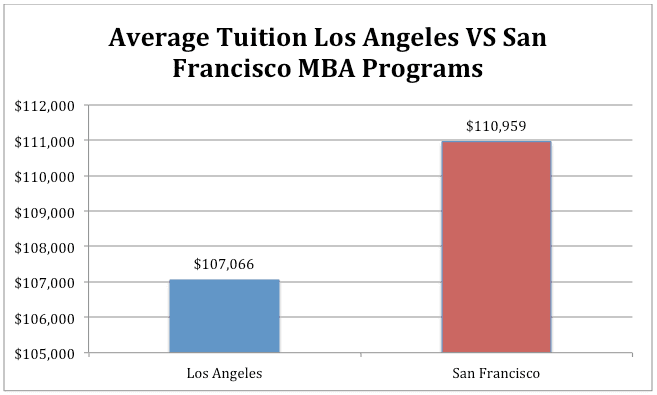
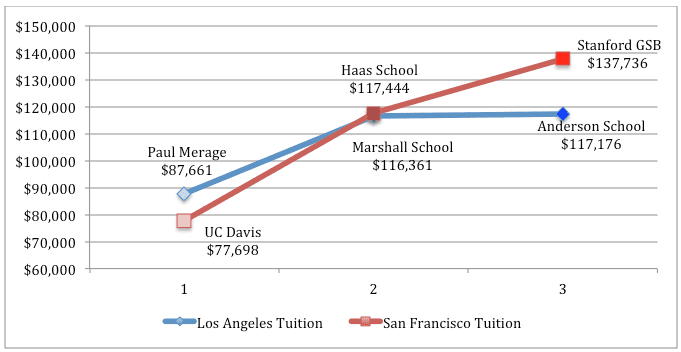
California MBA GMAT Averages
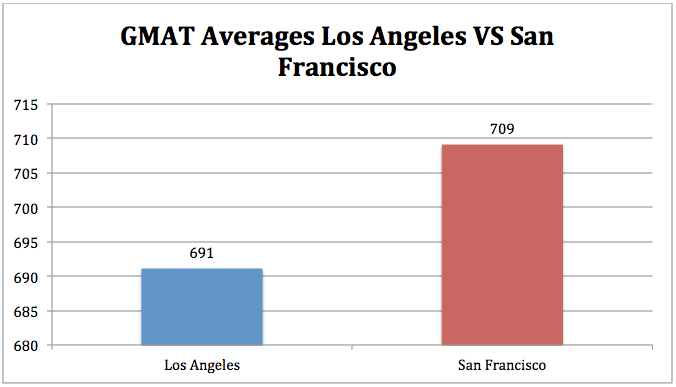
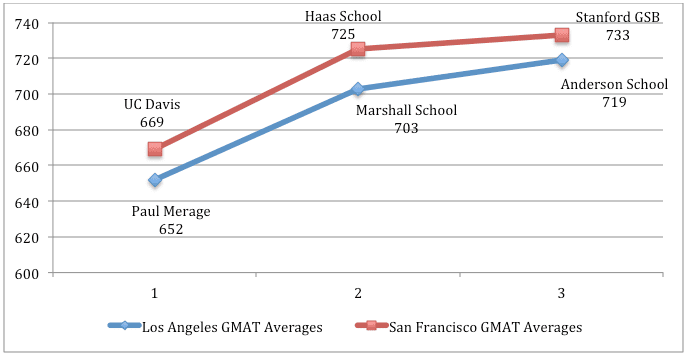
California MBA Post-Graduation Salaries
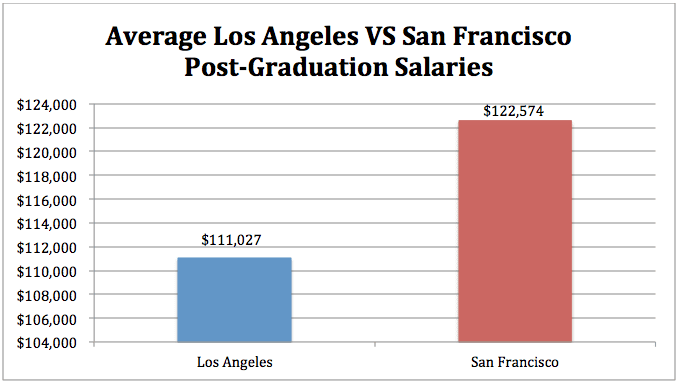
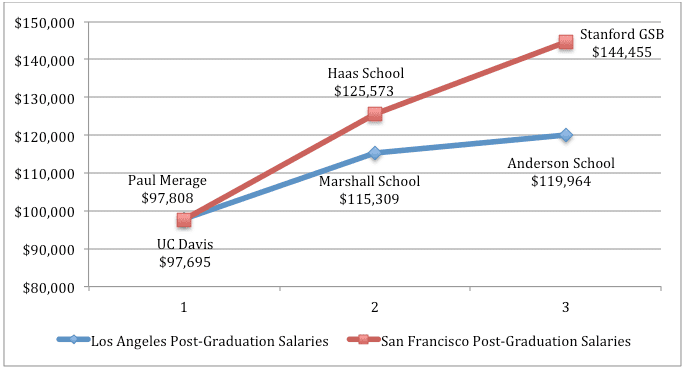
AI and God, from Google and Amazon – Chicago News
Let’s explore some of the most interesting stories that have emerged from Chicago business schools this week.
Siri, Should I Believe in God? – Mendoza Business Magazine
Notre Dame’s Mendoza College of Business recently published an article that explores the shortcomings of AI-driven digital assistants like Apple’s Siri and Amazon’s Alexa when it comes to existential and religious questions.
According to the article, “the overwhelming majority of youth in the digital age prefer Google searches and even disembodied voices to get the information they need about virtually everything.”
The problem, according to administrative vice director at the Vatican observatory and philosophy of science expert Rev. Paul Mueller, S.J., is that “Siri, like a vanilla politician, wants to offend no one, will not challenge or provoke.”
“Siri will be coy regarding religious questions, to avoid the risk of giving offense. [Digital assistants] will at most promote generic niceness, and perhaps something akin to the modern liberal values that church and state should be separate and religion should be a private affair.”
David Hart, a Notre Dame philosophy of mind instructor, adds, “At this point I think that technology is altering habits of mind in a rather distressing way. If there’s a danger in computers, it’s not that they are going to become conscious, but that they’re forcing us to become unconscious.”
Check out the full article here.
Gies Alumni Named to Crain’s 20 in their 20s – Gies School of Business Blog
Crain recently named two Gies College of Business MBA alumni—Tiesta Tea co-founder Dan Klein and Amber Agriculture founder Lucas Frye—among its 2018 Crain’s Chicago Business 20 In Their 20s.
Klein writes, “We knew from the beginning that we could be successful with 20-somethings if we could demystify high-quality, loose-leaf tea. Instead of a Chinese green tea, we do a ‘Fruity Pebbles Slenderizer’ tea.” This approach has enabled Tiesta Tea to win over a “young, health-obsessed market.”
Lucas Frye’s startup Amber Agriculture offers a pellet-shaped device that helps farmers monitor moisture, on which he explains the entire “ag value chain is based.” The article explains how Frye’s device works: “Toss the pellet into an avalanche of grain, whether in a storage bin or on a barge, and it tracks moisture levels. When necessary, it triggers fans for aeration.”
Read the full article here.
UIC Business Scholar Alleia James says “Hola” to Spain this Summer – UIC Business Blog
UIC Business Scholar Alleia James writes about her upcoming study abroad experience as part of the “Business, International Relations and Spanish at the University of Deusto” program in Spain.
James’ attraction to Spain is rooted in the country’s “deep history and sophisticated culture,” but the study abroad program’s integrated “company visits to Mondragon Cooperative Society, Bilbao Stock Market, and IDOM Consulting” made it a no-brainer.
Financial support from the Honors College Study Abroad Scholarship, Honors College Sally and Kevin Desouza Family Scholarship, Financial Executives International Chicago Chapter Scholarship, UIC CHANCE Financial Assistance Scholarship, UISAVES Scholarship, as well as financial support via a GoFundMe campaign will facilitate James’ trip.
James writes, “I am super thrilled to travel to different parts of Europe and speak to as many locals as possible! I have dreamed of walking on cobblestone sidewalks, watching Spanish La Liga football in person, visiting Gaudí’s La Pedrera, and zipling in Comares. I can’t wait to take adventures and explore Spain with my study abroad group. I hope to make lifelong friends on this trip and become more independent.”
The full article can be found here.
Five Best Business Schools for Breaking Into Venture Capital
While most MBA graduates looking to go into finance typically choose investment banking, venture capital has become an increasingly popular employment destination in recent years. VC is popular because it’s both lucrative and challenging, offering a unique career path that is deeply involved in the success of startups. Continue reading…
Healthcare Management MBAs in Los Angeles
California’s healthcare systems are under a lot of stress. According to the Orange County Register, the state’s healthcare staffing shortages are projected to widen as the population grows and doctors retire. Continue reading…
MBA Job Destinations: Wolters Kluwer
The average person may not know what international information services firm Wolters Kluwer does, or even how to pronounce it But when it comes to post graduate job placement, every MBA knows (or should know) the Dutch company’s name, and its status as a top MBA recruiter. Continue reading…
Top MBA Internship Opportunities in the London Metro
As a center for global commerce and business, London is one of the top cities in the world to earn an advance business degree and secure an MBA internship. Continue reading…
HBS Reviews Elon Musk’s Compensation Plan, and More – Boston News
In case you missed it, let’s explore some of the most interesting stories that have emerged from Boston business schools this week.
Elon Musk’s Unusual Compensation Plan Isn’t Really About Compensation at All – Harvard Business Review
Harvard Business School faculty member George Serafeim, the Jakurski Family associate professor of business administration, recently published his insight into the compensation package Tesla shareholders awarded CEO Elon Musk this year—“likely the largest compensation package ever awarded to a CEO.”
Serafeim argues that the design of the compensation plan and its announcement were about “signaling a credible commitment to Tesla’s purpose: to become a clean energy giant that helps address climate change by transforming mobility. To get there, Musk needs not only the normal sort of investor confidence, but also for investors to buy into his radical vision for the company.”
Serafeim further explains:
“Musk’s compensation plan, with its ambitious targets for market capitalization, focuses the mind on exactly this vision. For Tesla to reach a $650 billion valuation by 2028, the market will have to shift dramatically, with electric vehicles becoming the overwhelming percentage of all new sales. That would boost Tesla revenues from both vehicles and batteries. Such a future would also likely require that Tesla’s autonomous pilot technology becomes state-of-the-art, allowing it to be used safely and widely in Tesla vehicles but also potentially through licensing by other players.”
You can read more about Serafeim’s insight here.
Finance by Day, Pro Soccer by Night – Carroll School of Management News
The Boston College Carroll SOM recently profiled Issey Maholo ’07, a polymath who spends his days as VP of prime brokerage for J.P. Morgan and his nights as goalie for the Hong Kong Football Club.
Maholo, a native of Tokyo born to a Congolese father and Japanese mother, writes, “There will be plenty of excuses you can make in life as to why you should stop doing what you love to do.” He also notes the parallels between his vocation and avocation, particularly when it comes to teamwork:
“One person can shape a game, but usually not a whole season. It’s the same in finance—someone can bring in a big mandate, but you all have to pull together to become the top bank in Asia.”
You can read more about Maholo here.
The Quest for Error-Free Care – Sawyer Business School Blog
The Suffolk University Sawyer Business School recently hosted a panel discussion sponsored by the Suffolk University Chapter of the Institute for Healthcare Improvement (IHI), which touched upon “trends in the industry, patient safety, how the patient experience has improved over the decades, job-hunting advice, and many other subjects.”
The talk featured three Boston health care leaders: Lahey Hospital and Medical Center Chief Quality and Safety Officer Dr. Judith Melin; Mass General Hospital Associate chief quality & safety officer Mary Cramer; and Professor Elizabeth Turner, a nurse-attorney whose practice focuses on health care law.
Professor Mona Al-Amin, faculty adviser to the IHI group, writes, “The importance of this event was that students learned about quality improvement in healthcare organizations. They also got to ask questions about the field. And they got to learn about career choices and what skills they might need.”
You can read all the takeaways from the discussion here.
Mount Saint Mary’s MBAs Head to China, and More – Los Angeles News
We’ve rounded up some of the top stories coming out of Los Angeles metro area business schools this week.
Business Trip to China – Mount Saint Mary’s Newsroom
MBA students at the Mount Saint Mary’s University, Los Angeles recently took a nine-day trip to China as part of their studies in global business. Gannan University, a sister school of Mount Saint Mary’s, recently hosted the students in their third semester in the MBA program.
The trip, which was led by alumna and associate professor Katherine Whitman, included visits to several companies and the opportunity to take a deeper look into the country’s business operations. Students got the chance to go inside the factory of a joint Canadian-Chinese venture in auto transmissions, the research and development labs of a pharmaceutical company and more. And thankfully, even this business trip wasn’t all business- students had the chance for several cultural excursions and a final stop in one of the world’s largest financial centers, Hong Kong.
Read more about the Mount St. Mary’s MBA trip to China and their immersive global business education here.
Why Would a Former Investment Banker Want to Run Los Angeles Schools?– Marketplace.org
Austin Beutner, a former investment banker and past deputy mayor of Los Angeles, has recently been appointed as superintendent for the Los Angeles Unified School district. The second largest school district in the country, the LAUSD currently includes more than 640,000 students in schools across southern California. This week, Beutner was interviewed by Marketplace to discuss his change from business to education, and how this could inform the way he leads the district.
“Schools don’t have a bottom line, but that doesn’t mean you can’t measure and hold accountable,” Beutner said, examining the differences between various environments. “It doesn’t mean you can’t make sure your workforce is well trained and have the tools they need to succeed.” According to Beutner, many of the same skills learned in business are applicable to running a school district, helping provide him with the background necessary to work towards closing the opportunity gap and better serve the needs of the kids. “… part of the challenge is going to be to have to make sure that where we are investing resources today reflects the mission of the organization,” Beutner commented in the interview, “which is to help every child achieve, and reflects the values of the community it serves.”
To read more of Beutner’s interview with Marketplace, click here.
Graduate Students Participate in University’s Inaugural Three Minute Thesis Competition for Cash Prize and Bragging Rights – Chapman University Newsroom
An MBA student at Argyros School of Business Chapman University recently took first prize in the annual Three Minute Thesis Competition (3MT), among fourteen other Chapman graduate students across six colleges. The competition, which began ten years ago in Queensland, Australia, has today become an annual competition taking place at more than 200 universities across the globe. The competition forces students to think about their research in a way that can be fun and engaging for audiences outside of their field. Student presentations were judged based on effective communication, visuals, timing and delivery.
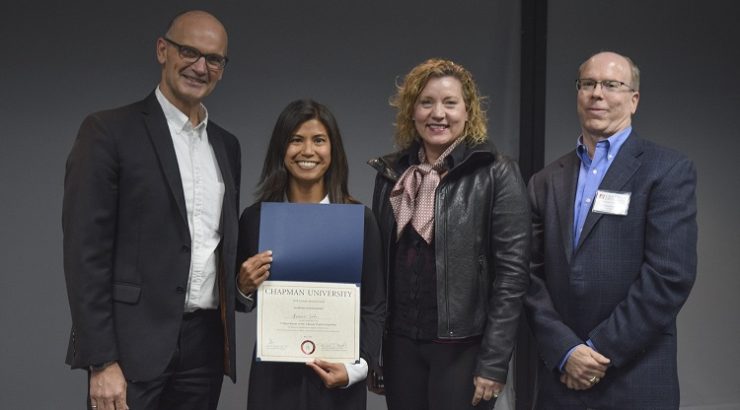
Chapman Argyros MBA Rowena Zahn, ’18 / Photo via blogs.chapman.edu
The first place winner was Rowena Zahn (MBA, Food Science ’18), who was awarded with $1,000. Zahn’s research, “Optimization of DNA-based methods to identify elasmobranch species in shark cartilage pills,” attempts to identify the species of shark used in dietary supplements (which often use shark cartilage for its anti-inflammatory effects) in order to identify mislabeled or vulnerable species in the pills.
You can read more about Zahn’s research and the 3MT competition here.
The Best Toronto Business School Internship Opportunities
Toronto is known as one of the major financial centers in North America, and boasts a high concentration of banks and brokerage firms in its bustling Financial District. The city is also home to the Toronto Stock Exchange—the world’s seventh-largest stock exchange by market capitalization.
Where Can I Get My Summer Internship?
In part one of our primer on MBA internships—”What is a Summer Internship and Why Should I be Interested?“—we took a closer look into the benefits of having a summer internship and where to start to look for one. Today, we’ll start to dive deeper into what types of opportunities are available, which companies offer them, and the potential salaries interns can make.
Where Can I Find a summer Internship?
You might already be sold on the idea of getting a summer internship, but if you’re going to reap the benefits of an internship, you’ll have to find one first.
A look at summer interns at business schools throughout the country reveals some common trends. While students find and get internships in a variety of ways, the most common method by far as through university resources. At the Booth School of Business at the University of Chicago, for example, 86.7 percent of students had their internships facilitated by the school, whether through campus interviews, connections made through networking, or other sources like faculty and student groups. For the much smaller percentage who found summer internships on their own, it was a fairly even split between students with personal connections and those who applied directly through a company’s website or job board.
If you’re looking for the perfect summer internship, making use of your school’s Career Services department can be crucial part. A quick look at the Booth School’s Career Services can help make sense of that 86.7 percent number: the office provides students with help in networking, interviewing, negotiating and more. These skills might be gained through workshops, one-on-one coaching, and other techniques to help steer students through their internship experiences and onto careers.
What Will I Be Doing?
The types of opportunities available for MBA summer internships are just as varied as the students themselves. At the University of Pennsylvania’s Wharton School, two functions emerged as the most popular (marketing and education, with 17.2 percent of Wharton interns and 15.4 percent, respectively), but overall revealed a huge variety of industry and fields. From hospitality to insurance to real estate, Wharton student interns spent their summers doing a little bit of everything. Students also did not seem to be restricted in their internship by location. While 28 students did stay in the state of Pennsylvania to complete their internship, a nearly even number took on internships in New York City, and many more spread throughout the country in states like California, Massachusetts, and the District of Columbia. Over 22.5 percent of students even completed internships outside of the United States.
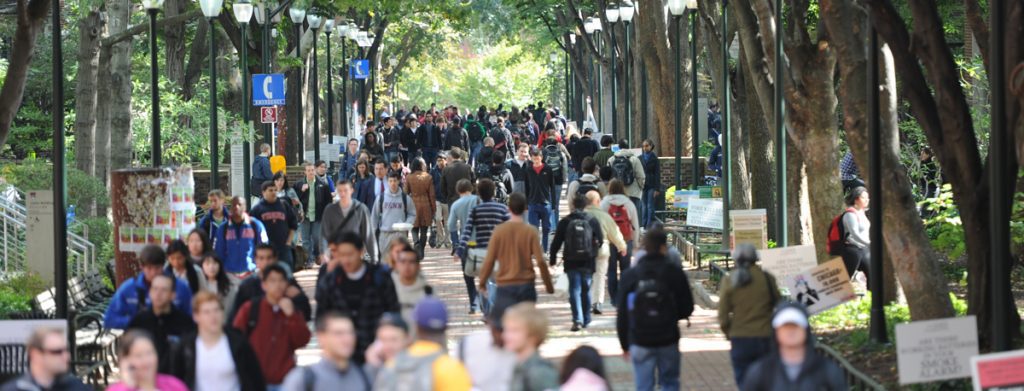
Nearly a quarter of Wharton MBAs complete their summer internships outside of the United States.
The type of work performed by interns each summer can also vary heavily, depending on the company, the position, and even a students own career goals and abilities. There is also a lot of variety as far as the scope of each internship: while some interns work full-time hours over the course of a summer, other roles may require less of an extended time commitment. For Wharton interns working full-time over the summer, internship length had a huge range and might run anywhere from three to seventeen weeks.
Most major companies that hire and recruit MBAs will have some type of internship program already in place, but looking at past internship and employment reports at your university can provide a good snapshot of what types of companies students typically intern with. At Northwestern University’s Kellogg School of Management, there were a number of companies hiring more than three students, while some hired more than 25 Kellogg students. Companies like Amazon, McKinsey & Company, and the Boston Consulting Group emerged among the top hiring companies of MBA interns from Kellogg.
In a tech company like Amazon, the type of internships offered to students can also vary widely. Students interested in working for the company might find internships available in the Finance Leadership Development Program, the Retail Leadership Development Program, the AWS CloudPath Program manager and more.
How Much Will I Make?
With the length of every internship and the hours required varying so significantly, how can students be sure their internship can support them through the summer?
A look at MBA internships and the salaries they offer from month to month reveal a general trend of well-paid internships even in industries on the lower end of the payment range. Far from the typical unpaid internship that so often springs to mind when students search for summer gigs, payment for these MBA internships can range from $1,000 per month to more than $14,000. The tremendous range in these numbers is mostly the result of differences in industry and function for each internship. At the Anderson School of Management at UCLA, for instance, student interns in consulting reported salaries ranging from $4,333 to $14,083 per month. Even the industries with the lowest salaries overall still boast pay that can generally support a student’s cost of living for the summer. For job function, the highest paid internships were in management/strategy ($500-$14,083), while the lowest were in human resources ($520-5,600).
With the possibility of high salaries, networking opportunities, and even the chance to turn an internship into a full-time career, it’s no surprise that so many MBAs participate in summer internship programs. At UCLA Anderson, 227 students of 238 sought internships for the summer—and 227 found them.
Your internship goals also might help you pick the right MBA program if you are still undecided. Looking into the success rate of internship placements at each school, as well as where students typically intern and the range of salaries they earn, might make the difference between two otherwise equal programs.
Breaking Down the 2018 Financial Times Top Finance MBAs List
Big technology companies might be attracting top MBA talent, but they’re not the only ones in the running. Though the finance sector hasn’t seemed as popular in recent years, MBA employment is still holding its own in the industry. The difference is the types of jobs that the finance and banking sector are offering.
The finance industry offers a range of options when it comes to jobs. MBA students have the opportunity to work as part of in-house teams developing new digital strategies, working for fintech companies, and more. Finance and banking are still critical employers of MBA graduates. On average, 30 percent of graduates from top business schools around the world went into a career in finance. Continue reading…


















